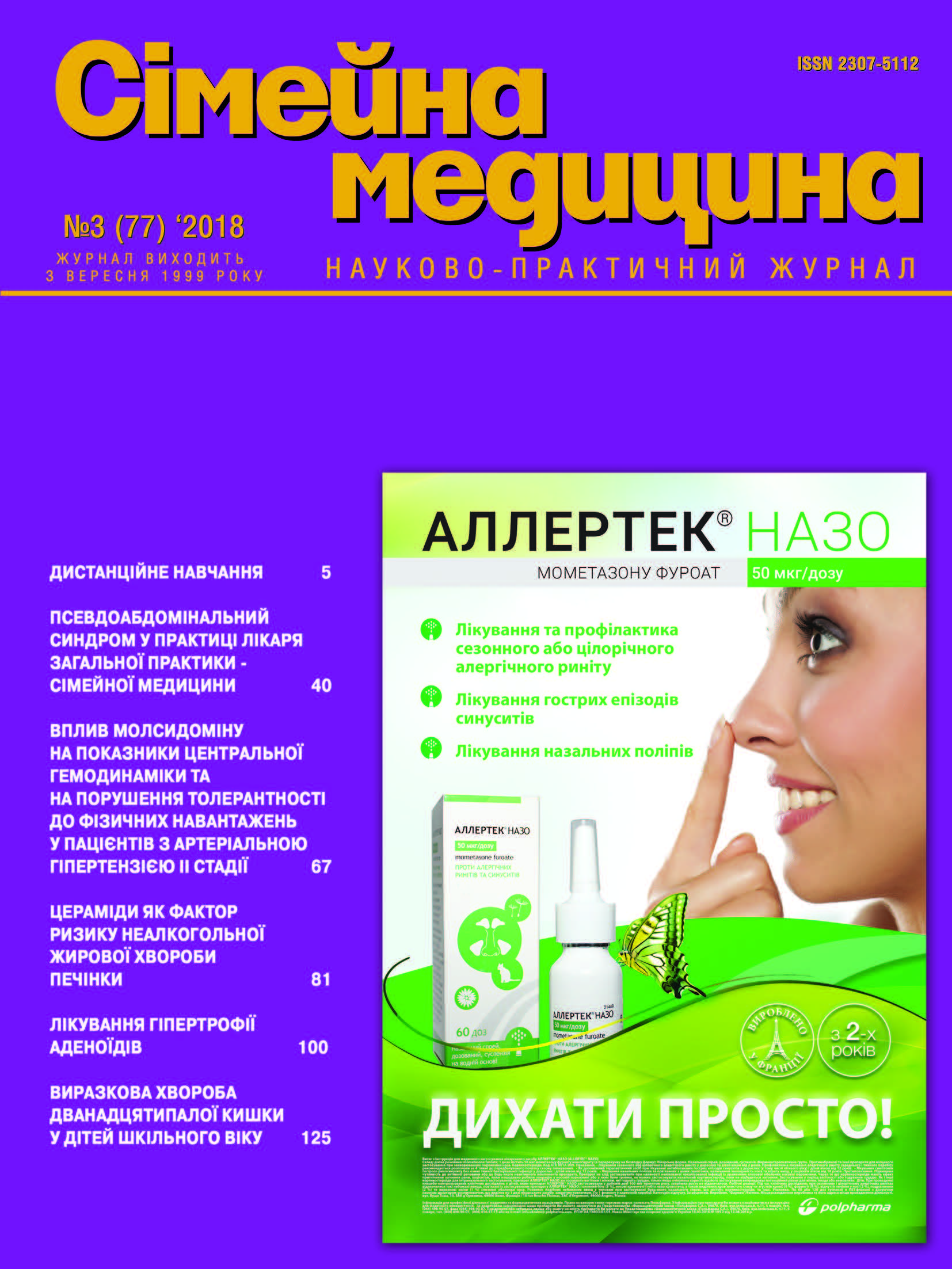Ceramide as a risk factor of nonalcoholic fatty liver disease
##plugins.themes.bootstrap3.article.main##
Abstract
##plugins.themes.bootstrap3.article.details##

This work is licensed under a Creative Commons Attribution 4.0 International License.
Authors retain the copyright and grant the journal the first publication of original scientific articles under the Creative Commons Attribution 4.0 International License, which allows others to distribute work with acknowledgment of authorship and first publication in this journal.
References
Vernon, G., Baranova, A., and Younossi, Z.M. Systematic review: the epidemiology and natural history of non-alcoholic fatty liver disease and non-alcoholic steatohepatitis in adults. Aliment Pharmacol Ther. 2011; 34: 274–85https://doi.org/10.1111/j.1365-2036.2011.04724.x
Angulo P. GI Epidemiology: nonalcoholic fatty liver disease. P. Angulo // Alimentary Pharmacology & Therapeutics. – 2007. – V. 25. – P.883–889. https://doi.org/10.1111/j.1365-2036.2007.03246.x
Oh M.K. Review article: diagnosis and treatment of non-alcoholic fatty liver disease. M.K.Oh, J.Winn, F. Poordad // Ailment Pharmacol Ther. – 2008. – Vol. 28. – P. 503–522. https://doi.org/10.1111/j.1365-2036.2008.03752.x
Exendin-4 improves steatohepatitis by increasing Sirt1 expression in highfat diet-induced obese C57BL/6J mice. J Lee, SW Hong, SW Chae et al. // PloS One. – 2012. –Vol.7, N2. – P.63–72. https://doi.org/10.1371/journal.pone.0031394
Randomized controlled trial testing the effects of weight loss on nonalcoholic steatohepatitis. K Promrat, DE Kleiner, HM Niemeier, E Jackvony et al. // Hepatology. – 2010. – V51. – P121–129 https://doi.org/10.1002/hep.23276
Targher G, Bertolini L, Padovani R, et al. Prevalence of nonalcoholic fatty liver disease and its association with cardiovascular disease in type 2 diabetic patients. Diabetes Care 2007; 30:1212–1218. https://doi.org/10.2337/dc06-2247
Amarapurkar D, Kamani P, Patel N, Gupte P, Kumar P, Agal S, Baijal R, Lala S, Chaudhary D, Deshpande A. Prevalence of non-alcoholic fatty liver disease: population based study. Ann Hepatol. 2007; 6(3):161–163. Park SH, Jeon WK, Kim SH, Kim HJ, Park DI, ho K, Sung IK. PDF
Vernon G, Baranova A, Younossi ZM. Systematic review: the epidemiology and natural history of non-alcoholic fatty liver disease and nonalcoholic steatohepatitis in adults. Aliment Pharmacol Ther 2011; 34: 274–285 http://dx.doi.org/10.1111/j.1365-2036.2011.04724.x
EASL–EASD–EASO Clinical Practice Guidelines for the management of nonalcoholic fatty liver disease 2016 https://doi.org/10.1016/j.jhep.2015.11.004
Argo CK, Caldwell SH. Epidemiology and natural history of non-alcoholic steatohepatitis. Clin Liver Dis 2009; 13:511–31. https://doi.org/10.1016/j.cld.2009.07.005
Peverill W, Powell LW, Skoien R. Evolving concepts in the pathogenesis of NASH: beyond steatosis and inflammation. Int J Mol Sci 2014; 15:8591–638. https://doi.org/10.3390/ijms15058591
Bugianesi E, Moscatiello S, Ciaravella MF, et al. Insulin resistance in nonalcoholic fatty liver disease. Curr Pharm Des 2010; 16:1941–51. https://doi.org/10.2174/138161210791208875
Cusi K. Role of insulin resistance and lipotoxicity in nonalcoholic steatohepatitis. Clin Liver Dis 2009; 13:545–63. https://doi.org/10.1016/j.cld.2009.07.009
Musso G, Cassader M, Gambino R. Non-alcoholic steatohepatitis: emerging molecular targets and therapeutic strategies. Nat Rev Drug Discov. 2016, Apr;15(4):249–74. https://doi.org/10.1038/nrd.2015.3
Castro, B. M., Prieto, M. & Silva, L.C. Ceramide: a simple sphingolipid with unique biophysical properties. Prog. Lipid Res. 54, 53–67 (2014). https://doi.org/10.1016/j.plipres.2014.01.004
Gault, C.R. et al. (2010) An overview of sphingolipid metabolism: from synthesis to breakdown. Adv. Exp. Med. Biol. 688, 1–23 Full text
Frangioudakis, G. et al. (2010) Saturated-and n-6 polyunsaturated-fat diets each induce ceramide accumulation in mouse skeletal muscle: reversal and improvement of glucose tolerance by lipid metabolism inhibitors. Endocrinology 151, 4187–4196 https://doi.org/10.1210/en.2010-0250
Chocian, G. et al. (2010) High fat diet induces ceramide and sphingomyelin formation in rat’s liver nuclei. Mol. Cell. Biochem. 340, 125–131 https://doi.org/10.1007/s11010-010-0409-6
Nikolova-Karakashian, M.N. and Rozenova, K.A. (2010) Ceramide in stress response. Adv. Exp. Med. Biol. 688, 86–108 https://doi.org/10.1007/978-1-4419-6741-1_6
Holland, W.L. and Summers, S.A. (2008) Sphingolipids, insulin resistance, and metabolic disease: new insights from in vivo manipulation of sphingolipid metabolism. Endocr. Rev. 29, 381–402 https://doi.org/10.1210/er.2007-0025
Clarke, C.J. et al. (2006) The extended family of neutral sphingomyelinases. Biochemistry 45, 11247–11256 https://doi.org/10.1021/bi061307z
Mari, M. and Fernandez-Checa, J.C. (2007) Sphingolipid signalling and liver diseases. Liver Int. 27, 440–450 https://doi.org/10.1111/j.1478-3231.2007.01475.x
Summers, S.A. (2006) Ceramides in insulin resistance and lipotoxicity. Prog. Lipid Res. 45, 42–72 https://doi.org/10.1016/j.plipres.2005.11.002
Semple, R.K. et al. (2009) Postreceptor insulin resistance contributes to human dyslipidemia and hepatic steatosis. J. Clin. Invest. 119, 315–322 https://doi.org/10.1172/JCI37432
JeBailey, L. et al. (2007) Ceramide and oxidant-induced insulin resistance involve loss of insulin-dependent Racactivation and actin remodeling in muscle cells. Diabetes 56, 394–403 https://doi.org/10.2337/db06-0823
Ribaux, P.G. and Iynedjian, P.B. (2003) Analysis of the role of protein kinase B (cAKT) in insulin-dependent induction of glucokinase and sterol regulatory element-binding protein 1 (SREBP1) mRNAs in hepatocytes. Biochem. J. 376, 697–705 https://doi.org/10.1042/BJ20031287
Colombini, M. (2010) Ceramide channels and their role in mitochondriamediated apoptosis. Biochim. Biophys. Acta 1797, 1239–1244 https://doi.org/10.1016/j.bbabio.2010.01.021
Mari, M. et al. (2008) Mechanism of mitochondrial glutathione-dependent hepatocellular susceptibility to TNF despite NF-kappaB activation. Gastroenterology 134, 1507–1520 https://doi.org/10.1053/j.gastro.2008.01.073
Edelmann, B. et al. (2011) Caspase-8 and caspase-7 sequentially mediate proteolytic activation of acid sphingomyelinase in TNF-R1 receptosomes. EMBO J. 30, 379–394 https://doi.org/10.1038/emboj.2010.326
Mangesh Pagadala, Takhar Kasumov,Arthur J. McCullough,Nizar N. Zein,and John P. Kirwan Role of Ceramides in Nonalcoholic Fatty Liver Disease Trends Endocrinol Metab. 2012 Aug; 23(8): 365–371. https://dx.doi.org/10.1016%2Fj.tem.2012.04.005





